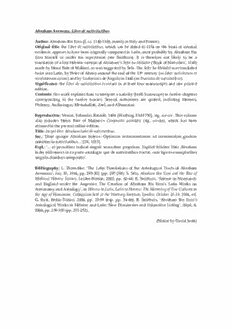
Liber de Nativitatibus PDF
Preview Liber de Nativitatibus
Abraham Avenezra, Liber de nativitatibus Author: Abraham Ibn Ezra (fl. ca. 1140‐1160, mainly in Italy and France). Original title: the Liber de nativitatibus, which can be dated to 1154 on the basis of internal evidence, appears to have been originally composed in Latin, most probably by Abraham Ibn Ezra himself or under his supervision (see Smithuis). It is therefore not likely to be a translation of a lost Hebrew version of Abraham’s Sefer ha‐Moladot (‘Book of Nativities’, 1148) made by Henri Bate of Malines, as was suggested by Sela. The Sefer ha‐Moladot was translated twice into Latin, by Peter of Abano around the end of the 13th century (as Liber nativitatum et revolutionum earum) and by Ludovicus de Angulo in 1448 (as Tractatus de nativitatibus). Significance: the Liber de nativitatibus is extant in at least four manuscripts and one printed edition. Contents: this work explains how to interpret a nativity (birth horoscope) in twelve chapters corresponding to the twelve houses. Several authorities are quoted, including Hermes, Ptolemy, Andruzagar, Messahallah, Zael, and Albumasar. Reproduction: Venice, Erhardus Ratdolt, 1484 [Warburg FAH 750], sig. a2r‐c4v. This volume also includes Henri Bate of Malines’s Compositio astrolabii (sig. c5r‐d6r), which has been retained in the present online edition. Title: Incipit liber Abraham Iudei de nativitatibus. Inc.: ‘Dixit quoque Abraham Iudeus : Optimum instrumentorum ad inveniendum gradum orientem in nativitatibus…’[TK, 1015]. Expl.: ‘... et pecudibus iudicat singuli secundum proprium. Explicit feliciter liber Abraham Iudei utilissimus in ea parte astrologie que de nativitatibus tractat, cum figuris exemplaribus singulis domibus antepositis’. Bibliography: L. Thorndike, ‘The Latin Translations of the Astrological Tracts of Abraham Avenezra’, Isis, 35, 1944, pp. 293‐302 (pp. 297‐298); S. Sela, Abraham Ibn Ezra and the Rise of Medieval Hebrew Science, Leiden‐Boston, 2003, pp. 62‐64; R. Smithuis, ‘Science in Normandy and England under the Angevins: The Creation of Abraham Ibn Ezra’s Latin Works on Astronomy and Astrology’, in Hebrew to Latin, Latin to Hebrew: The Mirroring of Two Cultures in the Age of Humanism. Colloquium held at the Warburg Institute, London, October 18‐19, 2004, ed. G. Busi, Berlin‐Torino, 2006, pp. 23‐59 (esp. pp. 34‐46); R. Smithuis, ‘Abraham Ibn Ezra’s Astrological Works in Hebrew and Latin: New Discoveries and Exhaustive Listing’, Aleph, 6, 2006, pp. 239‐338 (pp. 251‐252). (Notice by David Juste)
